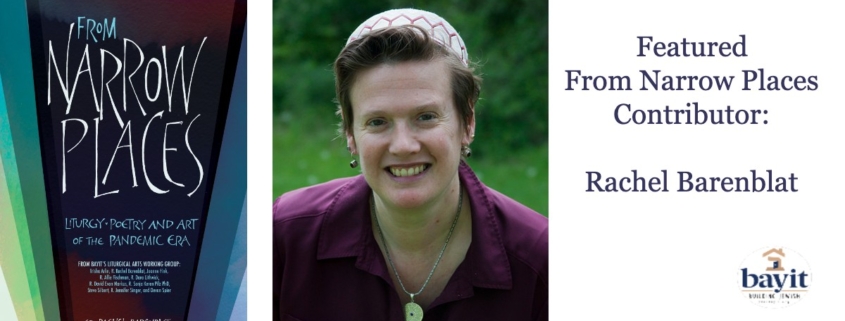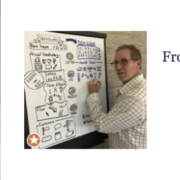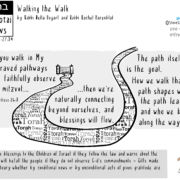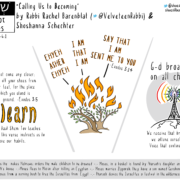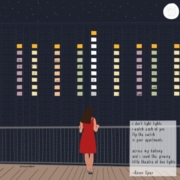Rachel Barenblat in From Narrow Places

Find Rachel’s work: velveteenrabbi.com, Velveteen Rabbi blog
Buy the book: yourbayit.org/narrow-places/
Rabbi Rachel Barenblat, the convener of Bayit’s Liturgical Arts Working Group and a fellow of Rabbis Without Borders, was named in 2016 by the Forward as one of America’s Most Inspiring Rabbis . She holds dual ordination as rabbi and mashpi’ah (spiritual director). Since 2011 Rachel has served as spiritual leader of Congregation Beth Israel (North Adams, MA). She also served as past co-chair of ALEPH and interim Jewish chaplain to Williams College. She holds an MFA in Writing and Literature from the Bennington Writing Seminars, and is author of six volumes of poetry, among them 70 faces: Torah poems (Phoenicia Publishing, 2011), Texts to the Holy (Ben Yehuda, 2018), and Crossing the Sea (Phoenicia, 2020.) Since 2003 she has blogged as The Velveteen Rabbi, and in 2008 TIME named her blog one of the top 25 sites on the internet. Her work has appeared in Reform Judaism, The Wisdom Daily, The Forward, and anthologies ranging from The Bloomsbury Anthology of Contemporary Jewish American Poetry (Bloomsbury) to The Women’s Seder Sourcebook (Jewish Lights). Her downloadable Velveteen Rabbi’s Haggadah for Pesach has been used around the world. She is visiting faculty at the Academy for Spiritual Formation (teaching both at two-year and at five-day retreats) and has also taught (among other places) at Beyond Walls, a writing program for clergy of many faiths at the Kenyon Institute.
Here are three selections from her work in From Narrow Places:
In the Sea
Here we are, in the sea. We can’t see the far shore.
Sand shifts beneath our feet. Who can trust it?
We don’t know how long this journey will be.
Will this next step drop us down into She’ol?
Sand shifts beneath our feet. We don’t trust it.
There are vaccines now, but not enough doses.
Will this next step drop us down into She’ol?
This much uncertainty clouds everyone’s vision.
There are vaccines now, but not enough doses.
So many deaths, and the earth just keeps turning.
This much uncertainty clouds everyone’s vision.
Sometimes it’s all we can do to keep going.
So many deaths, and the earth just keeps turning.
Remember restaurants, and singing, and theaters?
Sometimes it’s all we can do to keep going.
It’s easy to feel we’re alone in the journey.
Remember restaurants, and singing, and theaters?
Soon winter will be past, the snow over and gone.
It’s easy to feel we’re alone in the journey, but
look: we’re together, and God is here with us.
One day winter will be past, the virus over and gone.
We don’t know how long the journey will be, but
at least we’re together, and God is here with us.
Here we are, in the sea. We will reach the far shore.
Rachel Barenblat
How To
How to hold fear for so long
my shoulders learn a new shape.
How to watch numbers climb
higher, and then higher.
How to hold funerals
and kindergarten
over Zoom.
How to read subtle signals
via eyes alone.
How to re-grow scallions in water
because there might not be
more to buy.
How to feel our connections
though we’re apart.
How to sit
with unimaginable losses
even if they aren’t
our own, even if they are.
How to hold each other
when we can’t touch.
How to weep.
How to feel
everything that’s broken
—from mobile morgues
to the lies that fueled
shattered Capitol windows—
then ask the grief and fury
to drain away.
How to nurture
hope’s tiny tendrils
unfurling into flower
with every vaccination.
How to trust each other
take down our veils
and blink in unfamiliar sun.
Rachel Barenblat
The End of Day
The end of day.
That doesn’t mean
I’m leaving you.
After havdalah, when
the lights turn on
and today drains away
when this connection
feels like a mirage
that maybe you imagined
when the world begins
to fill every sacred silence
with noise
I’ll still be here
close as your heartbeat—
even if you forget.
Rachel Barenblat
Find Rachel’s work: velveteenrabbi.com, Velveteen Rabbi blog
Buy the book: yourbayit.org/narrow-places/
From Narrow Places: Liturgy, Poetry, and Art of the Pandemic Era was published this month by Bayit and features the collaborative work of our pluralist Liturgical Arts Working Group over the first eighteen months of the COVID-19 pandemic.

